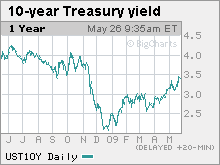Treasurys remain under pressure
Debt prices edge lower at the start of a busy auction week. Consumer confidence report sends stocks soaring.
NEW YORK (CNNMoney.com) -- Government bond prices fell Tuesday as investors weighed a heavy volume of supply headed to market this week, and a better-than-expected U.S. consumer confidence report.
Jitters over North Korea firing nuclear missiles kept a floor under losses, however. Meanwhile, a key lending rate continued to hover near a record low.
Supply headed to market: The Treasury has been selling a record amount of debt as it works to fund its massive stimulus program for the economy, which has been stuck in recession for more than a year. Adding further pressure to the government's coffers, tax receipts have deteriorated as unemployment numbers grow.
The Treasury sold $40 billion in 2-year notes Tuesday, kicking off a week packed with debt auctions. The 2-year note sale was strongly bid for, with $117.5 billion in bids coming in for $40 billion in debt.
That was positive for the bond market as market participants have been concerned about whether there is enough demand to sop up the volume of supply in the pipelines. Even still, bond prices remained lower in the face of a 195-point rally in the Dow Jones industrial average (INDU).
The Treasury will auction $35 billion in 5-year notes and $26 billion in 7-year notes later this week. The sale of $101 billion in longer-maturity debt comes in addition to a slew of shorter-term bills being issued, including $61 billion worth of 3-month and 6-month bills, also sold on Tuesday. The onslaught of supply has pushed prices lower, raising yields to 6-month highs.
Fed's buyback campaign: Many key lending rates are tied to Treasury yields. The 30-year fixed mortgage rate, for example, is tied to the benchmark Treasury yield. In an effort to keep lending rates low and spur growth in the economy, the Federal Reserve initiated a $300 billion debt buyback.
The government is slated to buy an undisclosed amount of debt later this week. While the Treasury's demand has helped support the market, many analysts say that $300 billion is not a big enough campaign to make a dent in the market.
Consumer confidence: The New York-based Conference Board, an industry group, said on Tuesday its index of consumer attitudes jumped to 54.9 in May from a revised 40.8 in April, posting the biggest one-month jump since April 2003.
The positive report on consumer sentiment sent stocks up. Typically, stock and bond prices move in opposite directions. When investors feel more confident about the economy, they move funds into riskier assets like stocks and out of safer bonds.
North Korea: Even as sentiment in the U.S. improved, investors were still on edge about the global economic implications of North Korea testing nuclear missiles, buoying safe-haven assets such as Treasurys and the U.S. dollar.
The U.N. Security Council unanimously called North Korea's nuclear test a "clear violation" of international law. Then, North Korea fired two short-range missiles from its east coast on Tuesday.
Bond prices: The benchmark 10-year note slipped 26/32 to 96 14/32, and its yield rose to 3.55% from 3.45% late Friday.
Bond prices and yields move in opposite directions. The bond market was closed Monday in observance of Memorial Day.
The 30-year bond sank 1 23/32 to 95 30/32, and its yield rallied to 4.49% from 4.39%.
The 2-year note edged down 2/32 at 99 29/32 and yielded 0.91%.
Lending rates: A key bank-to-bank lending rate held steady at an all-time low, a positive sign for the health of the credit markets. The 3-month Libor was unchanged at 0.66%, according to Bloomberg.com.
Meanwhile, the overnight Libor rate was also unchanged at 0.23%. There was no overnight Libor rate published Monday in observance of Memorial Day.
Libor, the London Interbank Offered Rate, is a daily average of rates that 16 different banks charge each other to lend money in London. The closely watched benchmark is used to calculate adjustable-rate mortgages. More than $350 trillion in assets are tied to Libor. ![]()


